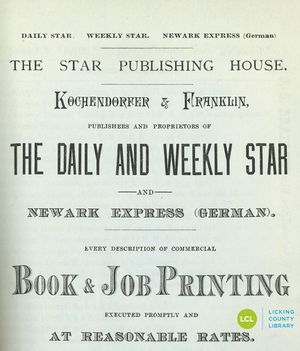Difference between revisions of "Newark Express"
| (12 intermediate revisions by the same user not shown) | |||
| Line 1: | Line 1: | ||
| − | First published in June 1880 to service the large German-speaking population of Newark, the ''Newark Express'', also known as the ''German Express'', was a German-language newspaper that reflected a broader trend in the United States during the latter part of the nineteenth century for newspaper access in languages other than English. | + | [[File:Newark express ad 1883-1884 city directory logo.jpg|thumb|1884 advertisement of ''Newark Express'' and other papers founded by F. Kochendorfer.]] First published in June 1880 to service the large German-speaking population of Newark, the ''Newark Express'', also known as the ''German Express'', was a German-language newspaper that reflected a broader trend in the United States during the latter part of the nineteenth century for newspaper access in languages other than English. Friedrich Kochendorfer, a German immigrant who arrived in Newark in 1852 who also served as a school teacher and entrepreneur, was its founder and editor for thirty-three years. <ref> "Mr. Kochendorfer Retires from the German Express," ''The Newark Daily Advocate'', Mar. 7, 1913 </ref> The ''Express'' was not his only publishing venture; in addition to the ''Express'', he started the ''Daily Evening Star'' and the ''Weekly Star'' in 1883 and co-founded the ''Newark Evening News'' in 1881. These other papers had much shorter runs than the ''Express'', by far his most successful printing venture. <ref> Brister, E., ''Centennial History of the City of Newark and Licking County, Ohio'', (1909), 393-395 </ref> |
| − | + | Kochendorfer gained a partner in the ''Express'' in 1895 when a recent German émigré to Newark, Julius Juch, joined as the ''Express''' compositor and then co-editor and co-owner. Juch took over sole publication of the paper in March 1913 when Kochendorfer retired and sold him his ownership of the company. <ref> "Mr. Kochendorfer Retires from the German Express," ''The Newark Daily Advocate'', Mar. 7, 1913 </ref> | |
| − | The ''Express'' would continue as the German-language paper in Newark for four years under Juch, but the trajectory of the paper would change when the United States joined WWI allied against the German Empire in 1917. Like | + | The ''Express'' would continue as the German-language paper in Newark for four years under Juch, but the trajectory of the paper would change when the United States joined WWI allied against the German Empire in 1917. Like other German-American editors of the day who feared being viewed as anti-American and pro-German during the conflict, Juch converted the ''Express''' primary language to English and also changed its name as well, rebranding as the ''[[Newark Leader]].'' |
| − | J.G. | + | '''J.G.''' |
| + | |||
| + | |||
| + | Return to [[Newspapers]] main page. | ||
==References== | ==References== | ||
Latest revision as of 08:30, 6 October 2021
First published in June 1880 to service the large German-speaking population of Newark, the Newark Express, also known as the German Express, was a German-language newspaper that reflected a broader trend in the United States during the latter part of the nineteenth century for newspaper access in languages other than English. Friedrich Kochendorfer, a German immigrant who arrived in Newark in 1852 who also served as a school teacher and entrepreneur, was its founder and editor for thirty-three years. [1] The Express was not his only publishing venture; in addition to the Express, he started the Daily Evening Star and the Weekly Star in 1883 and co-founded the Newark Evening News in 1881. These other papers had much shorter runs than the Express, by far his most successful printing venture. [2]Kochendorfer gained a partner in the Express in 1895 when a recent German émigré to Newark, Julius Juch, joined as the Express' compositor and then co-editor and co-owner. Juch took over sole publication of the paper in March 1913 when Kochendorfer retired and sold him his ownership of the company. [3]
The Express would continue as the German-language paper in Newark for four years under Juch, but the trajectory of the paper would change when the United States joined WWI allied against the German Empire in 1917. Like other German-American editors of the day who feared being viewed as anti-American and pro-German during the conflict, Juch converted the Express' primary language to English and also changed its name as well, rebranding as the Newark Leader.
J.G.
Return to Newspapers main page.
